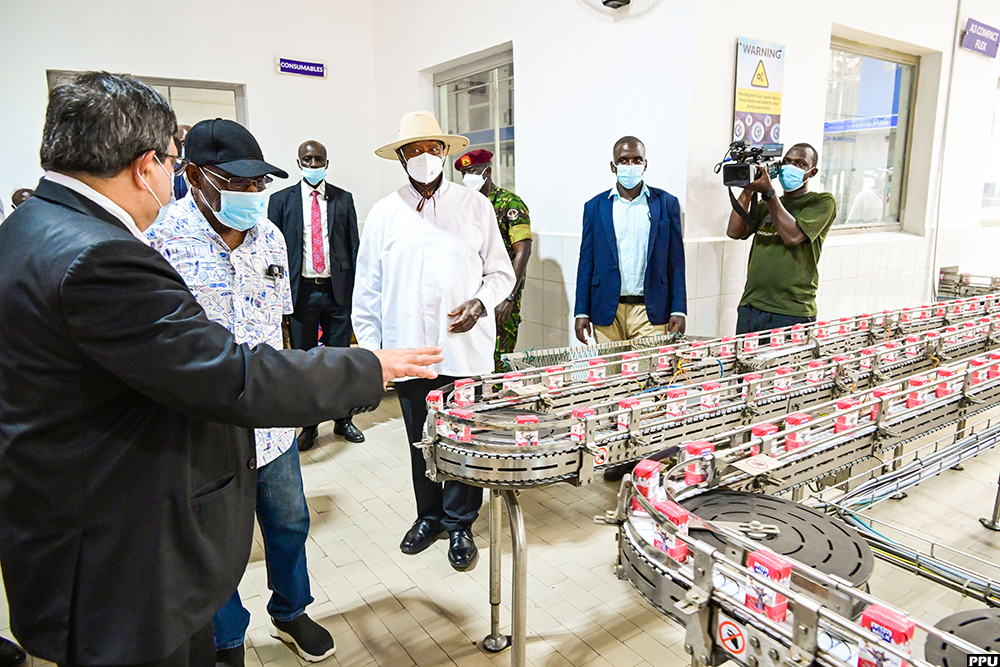Nigeria has committed itself to importing Uganda’s processed milk and coffee, following discussions between President Yoweri Kaguta Museveni and former Nigerian President, H.E. Olusegun Obasanjo. The announcement came during Obasanjo’s visit to Uganda, where he toured key agricultural hubs and engaged with local farmers, signalling a new era of economic collaboration between the two nations.
Uganda’s milk production grew by 37 per cent to 3.85 billion litres in the year 2022/2023, against the odds like drought in some production areas. The Ministry of Agriculture, Animal Industry and Fisheries reports show that the export value has increased by more than half to 264.5 million dollars (or about 1 trillion shillings) up from 102.6 (388 billion shillings) registered the previous year.
According to a report by the Dairy Development Authority (DDA), by the end of June, 2023, Kenya took more than two-thirds of Uganda’s dairy and related exports for the period
On the other hand, Uganda’s coffee industry is also experiencing an extraordinary resurgence, marked by record-breaking achievements and strategic growth. In the financial year 2023/24, Uganda’s coffee exports reached an unprecedented value of USD 1.114 billion. This success reflects not just an increase in the volume of 6.13 million bags compared to 5.8 million bags the previous year—but also a substantial 35.29% rise in value.
During his visit, former Nigerian President H.E. Olusegun Obasanjo toured Pearl Dairy Farms Limited in Mbarara City, where he learned about Uganda’s impressive dairy capabilities. Uganda produces 5.7 billion litres of milk annually, positioning it as a key player in Africa’s dairy industry. Obasanjo expressed his intent to establish trade ties that would see Nigeria importing processed milk and coffee from Uganda.
“I am here to explore how Nigeria can buy Ugandan milk and expand the production of processed milk and coffee,” Obasanjo stated. He acknowledged that Africa often overlooks its potential, citing how Nigeria has long imported milk from Europe, despite Uganda having a surplus. “It’s only recently that I discovered Uganda is Africa’s leading exporter of milk,” he added.
President Museveni welcomed Obasanjo’s interest and emphasized Uganda’s ability to meet both local and international demand for milk and coffee. “Uganda can produce enough milk, not just for domestic consumption but for the entire African market,”
The tour continued with a visit to farmers in Kiruhura and Kazo districts, where Museveni encouraged local farmers to adopt modern farming practices. He advised against free-range grazing, promoting zero-grazing techniques and the use of silage to improve productivity. Museveni also urged farmers to think of their farms as businesses and register them as companies, ensuring sustainable family wealth. “You are not only producing for Uganda, but for the entire African market,” he reminded them.
Hon. Bright Rwamirama, Uganda’s Minister of State for Animal Industry, highlighted the country’s growing export potential, noting that milk exports are now valued at $264.5 million. He also outlined the government’s plan to combat livestock ticks, a key factor in increasing milk production. “We are developing a tick vaccine that is in its final stages,” Rwamirama shared, assuring farmers that the government is committed to supporting their efforts.
The visit also saw the commissioning of the newly refurbished Nshwere Church of Uganda, expanded by Tororo Cement Company Limited. The ceremony was attended by President Museveni and the First Lady, Janet Kataha Museveni, Minister of Education and Sports.
With Nigeria ready to import Uganda’s processed milk and coffee, this partnership is set to strengthen trade ties between the two nations, fostering economic growth and creating new market opportunities for Ugandan farmers.


